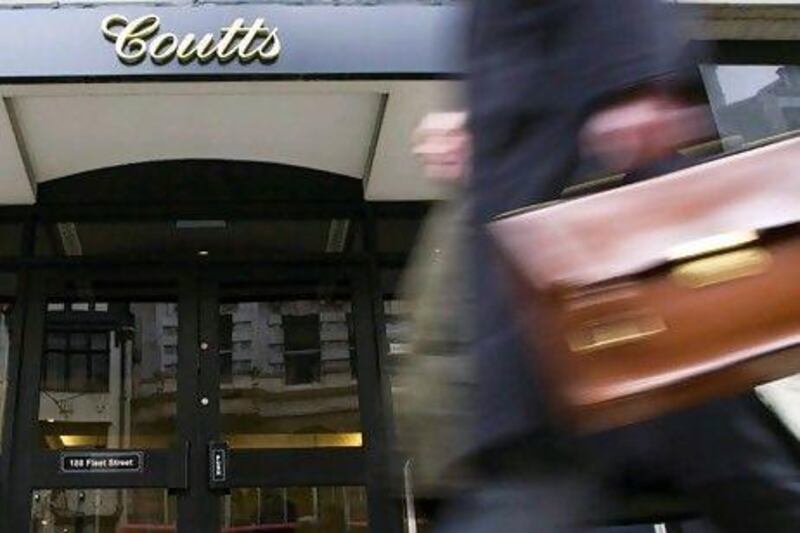Name a bank so exclusive that you can open an account only if you have £1 million (Dh5.8m) to slap down on the counter.
Now think of one so prestigious you would find a cash dispenser at Buckingham Palace but not at the supermarket. And guess which bank was so slapdash about the origins of certain deposits that it ran a serious risk of holding the assets of criminals and tyrants?
The answer is the same in each case. Coutts, the British bank favoured by customers including Queen Elizabeth II and super-rich Premier League footballers, has collected its second hefty fine in five months from the Financial Services Authority (FSA).
Last November, the 320-year-old bank - which is owned by Royal Bank of Scotland (RBS), in which British taxpayers have an 82 per cent stake - was fined £6.3m over the sale of savings products linked to American International Group (AIG), a troubled insurer based in the United States. Compensation was paid to disadvantaged clients.
In its latest brush with the authority, neither a long and noble history nor royal patronage could save Coutts from an even stiffer penalty, £8.7m. This was imposed for "serious and systematic" failings that caused an "unacceptable risk of handling the proceeds of crime", not to mention the ill-gotten gains of what British tabloids and politicians called "foreign despots".
Of 103 files examined by the FSA, 73 revealed deficiencies such as the failure to detect high-risk clients and lax monitoring of transactions.
It was the heaviest fine the authority has imposed for indiscretions that could potentially facilitate money laundering. And it would have been higher still - £12.5m - but for the bank's willingness to take its punishment and settle early. RBS has now been handed fines totalling £25m since its 2008 government bailout.
Coutts insists it has no evidence any laundering took place. But the FSA report refers to cases where appropriate client checks were not carried out, leading to a failure to "identify serious criminal allegations against those customers".
The Financial Times said that the issues centred on "clients in the Middle East and Eastern Europe, although were not limited to a specific country" and that the FSA was also reviewing possible breaches at four other banks in an investigation given "new relevance" by the Arab Spring.
The financial press has also speculated that Libya, Syria and Zimbabwe were among the sources of questionable funds.
The episode gave another battering to the bank's image. "Coutts' failings were significant, widespread and unacceptable," said Tracey McDermott, the FSA's acting director of enforcement. "Its conduct fell well below the standards we expect, and the size of the financial penalty demonstrates how seriously we view its failures."
Western banks are accustomed to sharp criticism for their part in the global crisis that began with the credit crunch and for the lavish bonuses paid to some staff and the culture of reckless greed that such incentives sometimes fostered.
But a rebuke for sloppiness with dubious funds makes for especially uncomfortable reading for a financial institution that began life even before the Bank of England.
It was in 1692 that the Coutts founder, John Campbell, set up business in one of London's most famous landmarks, the Strand. The bank's own potted history, displayed on its website, identifies 1692 as the same year in which the Salem witch trials were held in the US and clan chieftains were killed in the massacre of Glencoe in the Scottish Highlands.
As the wealth division of RBS, Coutts has offices in Dubai, Singapore and Hong Kong as well as London, Zurich, and Geneva.
In accepting the FSA's judgement, it admitted to "certain failures" to meet regulatory standards between December 2007 and November 2010.
Now, it says, anti-laundering procedures have been reviewed, with a number of improvements implemented and noted by the authority. A small number of clients have been "exited".
"We remain committed to ensuring that our systems and controls are robust and counter the risk of financial crime in all the markets in which we operate," said Rory Tapner, the Coutts chief executive.
Mr Tapner's calming words, uttered before RBS share prices rose on rumours of possible interest from Abu Dhabi in taking a stake, did not placate all critics.
Lord Oakeshott, a former treasury spokesman for the Liberal Democrats, the Conservatives' coalition government partners, said the behaviour highlighted by the FSA would have been unacceptable from any British bank but was "beyond belief" from RBS, a reference to its strong public ties. How, he asked, could executives including Stephen Hester, the RBS chief executive, "dream of taking bonuses when they preside over this systemic and widespread 'ask no questions' culture at Coutts?"
twitter: Follow our breaking business news and retweet to your followers. Follow us






